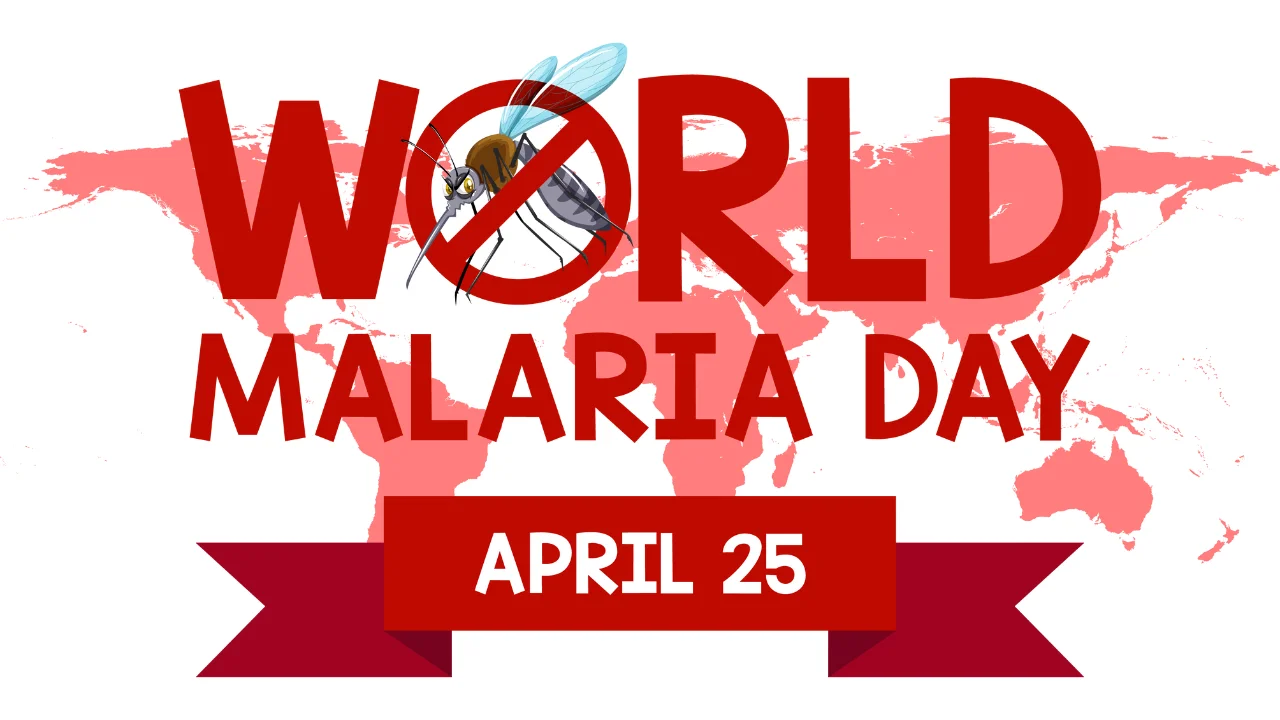World Malaria Day 2024
World Malaria Day 2024 will be held on Thursday, April 25th. This Day is an opportunity to unite against this deadly disease and build momentum towards a future free of malaria. By staying informed, taking action, and supporting the fight, we can contribute to a healthier world for all.
World Malaria Day 2024 Date
It falls on 25th April every year.
World Malaria Day Theme 2024
The official theme for World Malaria Day 2024 is “Accelerating the fight against malaria for a more equitable world”.
World Malaria Day 2024 Key Message
The key message this year is “Achieving the vision of a malaria-free world”.
Everyone has the right to quality, timely, and affordable services to prevent, detect, and treat malaria, yet this is not a reality for all.
On World Malaria Day, let’s “Accelerate the fight against malaria for a more equitable world” through:
- Ending discrimination and stigma
- Engaging communities in health decision-making
- Bringing health care close to where people live and work through primary health care
- Addressing factors that increase malaria risk
- Including malaria control interventions in universal health coverage
What is Malaria
Malaria is a serious and potentially fatal disease caused by parasites that are transmitted to humans through the bites of infected mosquitoes. It is a major public health concern, particularly in tropical and subtropical regions, affecting millions of people every year. Here’s a closer look at this critical topic:
Causes and Transmission
- The disease is caused by parasites belonging to the genus Plasmodium. The most common malaria parasite in humans is Plasmodium falciparum, responsible for the deadliest form of the disease.
- Anopheles mosquitoes act as the vectors, transmitting the parasites when they bite an infected person and then bite another person.
- Once inside the human body, the parasites travel to the liver and then multiply inside red blood cells, causing a range of symptoms.
Symptoms and Complications
- The typical symptoms of malaria include fever, chills, sweating, headache, muscle aches, fatigue, nausea, and vomiting.
- Severe malaria can lead to complications like severe anemia, kidney failure, seizures, coma, and even death, especially if not diagnosed and treated promptly.
Types of Malaria
- Four main types of malaria infect humans: Plasmodium falciparum, Plasmodium vivax, Plasmodium ovale, and Plasmodium malariae.
- P. falciparum is the most dangerous type, while the others typically cause milder illness.
Prevention and Treatment
- Prevention measures include using mosquito nets, insect repellents, and antimalarial medication for travelers to high-risk areas.
- Early diagnosis and treatment with effective antimalarial drugs are crucial to prevent complications and death.
- Researchers are also working on vaccines and other innovative solutions to control and ultimately eradicate malaria.
Global Impact
- According to the WHO, in 2022, there were 249 million cases of malaria and 608,000 deaths from the disease globally.
- Children under five years old are disproportionately affected, accounting for approximately 82% of all malaria deaths.
- The disease places a significant burden on healthcare systems and economies in affected regions.
Current Efforts and Challenges
- Global efforts are focused on reducing malaria cases and deaths, increasing access to prevention and treatment tools, and promoting research and development for new solutions.
- However, challenges remain, including drug resistance, insecticide resistance, and inadequate healthcare infrastructure in some regions.
Malaria is a preventable and treatable disease, but significant efforts are still needed to achieve elimination. By understanding the disease, and its impact, we can contribute to a world free from malaria.
History of World Malaria Day
World Malaria Day’s history is marked by a journey of growing awareness, increased commitment, and significant strides towards controlling and ultimately eradicating this devastating disease. Here’s a glimpse into its evolution:
Early Years (2000-2007)
- Africa Malaria Day: The story begins in 2001 when African governments established Africa Malaria Day on April 25th to highlight the disproportionate impact of malaria on the continent and promote regional control efforts.
- Focus on Awareness and Action: The day aimed to raise awareness about malaria prevention, and treatment, and mobilize resources for control programs within Africa.
Evolution to World Malaria Day (2008-Present)
- Global Recognition: In 2007, recognizing the global reach of malaria, the World Health Assembly adopted the proposal to rename Africa Malaria Day to World Malaria Day. This shift marked a significant step towards recognizing and tackling malaria as a global health challenge.
- Annual Themes: Since then, World Malaria Day has adopted yearly themes to focus attention on specific aspects of the fight against malaria. These themes have ranged from “Malaria: Time for Change” in 2008 to “Zero malaria – Invest to beat malaria” in 2022 and “End Malaria for Good” in 2023.
- Increased Momentum: Over the years, World Malaria Day has evolved into a platform for global advocacy, resource mobilization, and progress evaluation. It has fostered collaboration between governments, health organizations, NGOs, researchers, and communities, leading to:
- Increased funding for malaria control programs
- Improved access to prevention tools like bed nets and medication
- Development of new diagnostic and treatment methods
- Significant reduction in malaria cases and deaths, particularly in Africa
Looking Ahead
While significant progress has been made, the fight against malaria is far from over. World Malaria Day continues to play a crucial role in:
- Maintaining global commitment: Reminding the world of the ongoing burden of malaria and the need for sustained investment.
- Driving innovation: Highlighting the importance of research and development in finding new solutions for prevention, diagnosis, and treatment.
- Promoting equity and access: Ensuring that everyone, regardless of location or socioeconomic status, has access to malaria prevention and care.
World Malaria Day’s history is a testament to the power of collective action and unwavering determination in tackling global health challenges. As we move forward, World Malaria Day continues to be a vital beacon for a future free from malaria.
Significance of World Malaria Day
World Malaria Day, held annually on April 25th, holds immense significance on several levels, both globally and locally. Here are some key reasons why it matters:
Raising Awareness
- Spotlight on Malaria: World Malaria Day draws attention to this deadly disease, which still claims hundreds of thousands of lives each year, primarily affecting children in Africa. It brings the issue to the forefront of public discourse, prompting conversations and sparking action.
- Education and Understanding: By reaching millions of people around the world, it educates individuals and communities about the causes, symptoms, and prevention of malaria, empowering them to take necessary measures.
Inspiring Action
- Mobilizing for Change: World Malaria Day isn’t just about awareness; it’s about driving concrete action towards malaria control and eradication. The day serves as a platform for organizing initiatives like:
- Mosquito net distribution campaigns
- Community awareness drives
- Fundraising for research and development
- Empowering Individuals: It motivates people to adopt preventive measures in their daily lives, like using mosquito nets and seeking prompt diagnosis and treatment.
- Global Impact: The collective action inspired by World Malaria Day has led to significant achievements, including:
- Increased funding for malaria programs
- Improved access to diagnostic tools and medication
- Development of new prevention and treatment strategies
Building a Movement
- Strengthening Collaboration: World Malaria Day fosters a sense of unity and collaboration among government agencies, healthcare organizations, researchers, NGOs, and communities worldwide. It facilitates knowledge sharing, resource exchange, and coordinated efforts against malaria.
- Connecting Local Action: It connects individuals to local organizations and initiatives already working on malaria control, empowering them to participate and contribute to ongoing efforts.
- Inclusive Approach: By engaging people of all ages, backgrounds, and cultures, World Malaria Day promotes inclusivity and ensures that diverse voices are heard in shaping solutions.
Shifting Mindsets
- Human-Planet Connection: World Malaria Day reminds us that human health is inextricably linked to the health of the planet. It highlights the impact of environmental factors like climate change on the spread of malaria and the need for a holistic approach.
- Promoting Responsibility: Celebrating Earth as a home fosters a sense of responsibility toward protecting our environment and preventing infectious diseases like malaria.
- Investing in the Future: The day emphasizes the importance of long-term commitment and sustainable solutions. It urges us to consider the impact of our actions on future generations and the need to protect their health and well-being.
In conclusion, World Malaria Day’s significance extends far beyond a single day on the calendar. It catalyzes awareness, action, and progress, driving us towards a future free from malaria. By staying informed, taking action, and supporting the fight, we can contribute to a healthier world for all.
Remember, every action, even small, can contribute to the positive change we need. So, let’s all use World Malaria Day as an opportunity to reflect, learn, and take action towards a future free from this preventable disease.
25th April 2024 Special Day
World Malaria Day in 2024 falls on the special date of 25th April, which is a Thursday. This global health observance provides a unique opportunity to unite worldwide against the deadly malaria disease and galvanize action toward a malaria-free future on this special day in April. By staying informed, taking action, donating, and supporting prevention and treatment efforts on this specific date and year – the 25th of April, 2024 – people and organizations can help end deaths from malaria and contribute to better health globally. The fight against this disease unites us on this special Thursday.
- RBI SO Syllabus and Exam Pattern 2025 for Grade A and B
- RBI SO Eligibility 2025, Check Qualification & Age Limit
- RBI SO Exam Date 2025, Check Phase 1 Schedule for Grade A/B
- RBI SO Apply Online 2025 Before 31st July for 28 Vacancies
- RBI SO Notification 2025 Out for 28 Vacancies of Grade A & B
- Free SSC CHSL Topic Wise Tests for English, Quant & More, Attempt Now

Hello, I’m Aditi, the creative mind behind the words at Oliveboard. As a content writer specializing in state-level exams, my mission is to unravel the complexities of exam information, ensuring aspiring candidates find clarity and confidence. Having walked the path of an aspirant myself, I bring a unique perspective to my work, crafting accessible content on Exam Notifications, Admit Cards, and Results.
At Oliveboard, I play a crucial role in empowering candidates throughout their exam journey. My dedication lies in making the seemingly daunting process not only understandable but also rewarding. Join me as I break down barriers in exam preparation, providing timely insights and valuable resources. Let’s navigate the path to success together, one well-informed step at a time.






